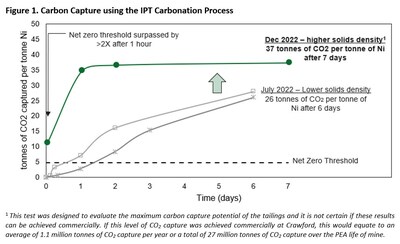Canada Nickel Announces Integration of Carbon Capture & Storage into Crawford Nickel Sulphide Project
Rhea-AI Summary
Canada Nickel Company has confirmed the integration of carbon capture and storage into its Crawford Nickel Project, positioning it as a potential leader in carbon storage in Ontario and Canada. The latest test work supports the IPT Carbonation process, demonstrating significant CO2 capture capabilities. An integrated feasibility study is expected by Q2 2023, with plans for production permitting by mid-2025. The project aligns with government climate initiatives and may qualify for significant tax credits, enhancing its financial viability for stakeholders.
Positive
- Crawford Nickel Project could become a major carbon storage facility in Ontario.
- Successful test results for IPT Carbonation process may lead to substantial CO2 capture, approximately 37 tons per ton of nickel.
- Eligible for refundable investment tax credits of 37.5% to 60% from 2022-2030.
- Aligned with government priorities on electric vehicles and climate change, potentially reducing shareholder dilution.
Negative
- Integrated feasibility study delayed until Q2 2023, potentially impacting investor confidence.
News Market Reaction 1 Alert
On the day this news was published, CNIKF declined 6.38%, reflecting a notable negative market reaction.
Data tracked by StockTitan Argus on the day of publication.
- Latest test work confirms ability to incorporate carbon capture and storage into Crawford project plant design
- Crawford Nickel Project has potential to become sole large scale carbon storage facility in Ontario and one of largest facilities in Canada
- Integrated Feasibility Study expected to be released in second quarter
TORONTO, Jan. 4, 2023 /PRNewswire/ - Canada Nickel Company Inc. ("Canada Nickel" or the "Company") (TSXV: CNC) (OTCQX: CNIKF) today announced that its latest test work results support the incorporation of carbon capture and storage into the Crawford Project.
The Company's In-Process Tailings ("IPT") Carbonation process is a novel method for accelerated carbon capture and storage that the Company believes has transformative potential. The latest test work confirms that existing process streams can be utilized for IPT Carbonation which the Company believes should allow it to be timely and cost effectively engineered and incorporated into the flowsheet.
As a result, the integrated feasibility study for the project is expected to be delivered in the second quarter of 2023. This delay has no impact on the overall timeline to production as the Company continues to target receipt of permits by mid-2025 with construction to follow.
"We believe the Crawford Project has the potential to be a case study in how critical minerals are developed in Ontario and Canada," said Mark Selby, Chair and CEO of Canada Nickel. "Crawford is poised to support the energy transition through the large scale production of critical minerals, including nickel and cobalt, and to become the sole North American producer of chromium, while also supporting the country's climate objectives through large scale carbon capture and storage."
The Company believes that the successful incorporation of IPT Carbonation could potentially allow a portion of the Company's project capital expenditures to become eligible for the carbon capture and storage refundable investment tax credits of
"We are developing Crawford in a manner aligned with the government's priorities regarding electric vehicles, critical minerals and climate change. The Company is exploring its eligibility for tax credits as well as other government funding programs related to the Critical Minerals Strategy that have the potential to improve overall project value and, most importantly for the Company shareholders, further reduce any potential dilution to finance it," said Selby.
"We look forward to continuing our positive momentum in 2023 as we complete this integrated feasibility study for Crawford, continue to successfully advance the Crawford permitting process, work with our recently appointed financial advisors to advance its overall financing package, and aggressively advance our recently acquired Texmont property with its potential for near-term production. We are also excited by our successful tests of the regional exploration potential at Reid, Deloro, Sothman, and Reaume which, as they are hosted in the same mineralization as Crawford, offer the same potential for integrated carbon capture and storage – setting the stage for a Zero Carbon Industrial Cluster in the Timmins-Cochrane region."
Canada Nickel's Crawford Project is hosted in ultramafic rock, which naturally absorbs and sequesters CO2. The potential to actively capture and sequester carbon was a key consideration in Canada Nickel's acquisition of the 42 km2 of target ultramafic rocks in the Timmins area which could anchor a zero-carbon industrial cluster in Timmins. Canada Nickel has developed a simple active process that utilizes tailings as generated in the milling process and injects a concentrated source of CO2 for a brief period of time. This novel process for accelerated mineral carbonation is called In Process Tailings Carbonation or IPT Carbonation, which fixes CO2 geologically while the tailings are still in the processing circuit, rather than after they have been finally deposited.
The Company believes that, given its relative simplicity, this process could be scaled up with availability of concentrated (rather than atmospheric) sources of CO2. This CO2 could potentially be delivered by downstream processing of Crawford concentrates, a wide range of industrial processing activities, green hydrogen production, or carbon capture facilities. The process demonstrates the potential to produce NetZero NickelTM and NetZero CobaltTM for the EV industry, NetZero IronTM and chromium for the stainless steel industry and generate substantial carbon credits during the process. The Company believes that the need for a concentrated source of CO2 for this process and the substantial CO2 capture and storage capacity potential of its ultramafic land position could form the basis for an entire Zero Carbon Industrial Cluster in the Timmins-Cochrane region.
The latest results from further lab scale testing at Kingston Process Metallurgy ("KPM") confirmed that a blend of tailings expected to be produced by Crawford and thickened to an expected operating tailings density could be successfully carbonated with the IPT Carbonation process - it is a significant result to demonstrate the process at higher solids densities as the pulp density and the tailings residence time will be a key driver of the process capital and operating costs. The testing also attempted to understand what ultimate carbon capture potential is possible and the test resulted in 37 tonnes of CO2 captured per tonne of nickel – 34 tonnes of that amount was captured within 25 hours. The 37 tonne figure is believed to represent a potential maximum and there is no certainty that such amount could be achieved in commercial operation (See Figure 1).
Arthur G. Stokreef, P.Eng (ON), Manager of Process Engineering & Geometallurgy and a "qualified person" as such term is defined by National Instrument 43-101, has reviewed and approved the technical information in this news release on behalf of Canada Nickel Company Inc.
Canada Nickel Company Inc. is advancing the next generation of nickel-sulphide projects to deliver nickel required to feed the high growth electric vehicle and stainless steel markets. Canada Nickel Company has applied in multiple jurisdictions to trademark the terms NetZero Nickel™, NetZero Cobalt™ and NetZero Iron™ and is pursuing the development of processes to allow the production of net zero carbon nickel, cobalt, and iron products. Canada Nickel provides investors with leverage to nickel in low political risk jurisdictions. Canada Nickel is currently anchored by its
For further information, please contact:
Mark Selby, Chair and CEO
Phone: 647-256-1954
Email: info@canadanickel.com
This press release contains certain information that may constitute "forward-looking information" under applicable Canadian securities legislation. Forward looking information includes, but is not limited to, the near-term production potential of the Texmont property, the carbon capture approach could allow production of Net Zero nickel and generation of an additional tonnes of CO2 credits per tonne of nickel produced after offsetting all emissions, the potential to turn nickel mine into a generator of carbon credits rather than generator of carbon emissions, the production of estimated average of 710,000 tonnes of carbon credits annually and 18 million total tonnes of CO2 of credits over expected life of mine at Crawford, the ability to monetize carbon credits, the ability to quantify carbon capture, emission estimates, the brucite content of the deposit, the scalability of the process, the metallurgical results, the timing and results of the feasibility study including the viability of the inclusion of the IPT Carbonation Process and related facilities as part of the project, the results of Crawford's PEA, including statements relating to net present value, future production, estimates of cash cost, proposed mining plans and methods, mine life estimates, cash flow forecasts, metal recoveries, estimates of capital and operating costs, timing for permitting and environmental assessments, realization of mineral resource estimates, capital and operating cost estimates, project and life of mine estimates, ability to obtain permitting by the time targeted, size and ranking of project upon achieving production, economic return estimates, the timing and amount of estimated future production and capital, operating and exploration expenditures and potential upside and alternatives. Readers should not place undue reliance on forward-looking statements.
Forward-looking statements involve known and unknown risks, uncertainties and other factors which may cause the actual results, performance or achievements of Canada Nickel to be materially different from any future results, performance or achievements expressed or implied by the forward-looking statements. The PEA results are estimates only and are based on a number of assumptions, any of which, if incorrect, could materially change the projected outcome. There are no assurances that Crawford will be placed into production. Factors that could affect the outcome include, among others: the actual results of development activities; project delays; inability to raise the funds necessary to complete development; general business, economic, competitive, political and social uncertainties; future prices of metals or project costs could differ substantially and make any commercialization uneconomic; availability of alternative nickel sources or substitutes; actual nickel recovery; conclusions of economic evaluations; changes in applicable laws; changes in project parameters as plans continue to be refined; accidents, labour disputes, the availability and productivity of skilled labour and other risks of the mining industry; political instability, terrorism, insurrection or war; delays in obtaining governmental approvals, necessary permitting or in the completion of development or construction activities; mineral resource estimates relating to Crawford could prove to be inaccurate for any reason whatsoever; additional but currently unforeseen work may be required to advance to the feasibility stage; and even if Crawford goes into production, there is no assurance that operations will be profitable.
Although Canada Nickel has attempted to identify important factors that could cause actual actions, events or results to differ materially from those described in forward-looking statements, there may be other factors that cause actions, events or results to differ from those anticipated, estimated or intended. Forward-looking statements contained herein are made as of the date of this news release and Canada Nickel disclaims any obligation to update any forward-looking statements, whether as a result of new information, future events or results or otherwise, except as required by applicable securities laws.
![]() View original content to download multimedia:https://www.prnewswire.com/news-releases/canada-nickel-announces-integration-of-carbon-capture--storage-into-crawford-nickel-sulphide-project-301712816.html
View original content to download multimedia:https://www.prnewswire.com/news-releases/canada-nickel-announces-integration-of-carbon-capture--storage-into-crawford-nickel-sulphide-project-301712816.html
SOURCE Canada Nickel Company Inc.









